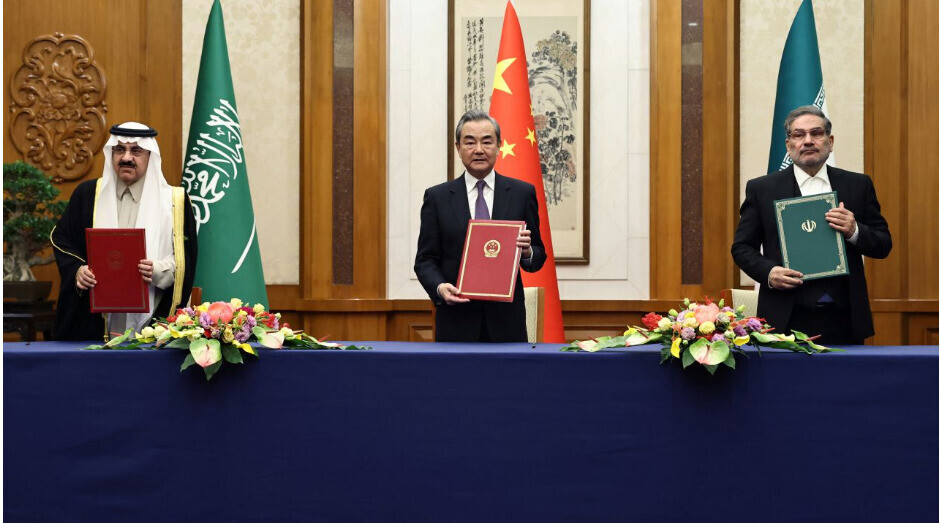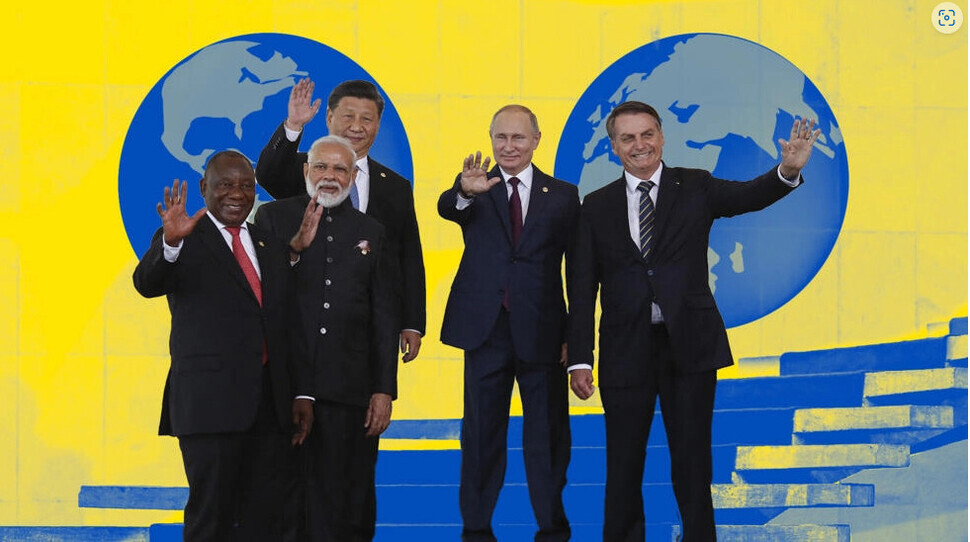hankyoreh
Links to other country sites 다른 나라 사이트 링크
In space between rivaling powers, Global South sees chance to pursue its own interests

As the world, fueled by the war in Ukraine and the strategic competition between Washington and Beijing, becomes divided into blocs reminiscent of the Cold War, the Global South’s rise is becoming increasingly evident as it tries to find a balance between the West on one side and China and Russia on the other.
Countries like India, Brazil, and Saudi Arabia, which had once enjoyed close ties with the US, are now strengthening relations with China and Russia to maximize their own national interests. In turn, this is placing a heavy burden on the US as such moves help lend strength to the multi-polarization of the world order.
On Wednesday, Brazil\'s Trade and Investment Promotion Agency (Apex-Brasil), released a statement that shocked the world, especially given Brazil’s status as one of the main countries of the Global South.
Apex-Brasil declared that, in order to \"reduce trade costs with China and further promote trade and investment” the two countries will pay using their own currencies, the yuan and real, instead of the US dollar when conducting trade.
The next day, Chinese Foreign Ministry spokesperson Mao Ning also shared Beijing’s perspective at a regular press conference. “Earlier this year, China and Brazil signed a memorandum of cooperation to establish renminbi (RMB) clearing arrangements in Brazil,” Mao said.
In other words, Brazil, the largest economy in South America, has now joined forces with China, which is trying to challenge the US “dollar hegemony” in the world.
China has been Brazil\'s largest trading partner since 2009, with trade between the two countries soaring to a whopping US$150.5 billion last year.
Meanwhile, surprising news has also come from the Middle East. On March 28, Saudi Arabia, which has maintained a solid energy alliance with the US since World War II, made a hugely consequential decision.
At a cabinet meeting that day, the Saudi government made the official decision to join the Chinese-led Shanghai Cooperation Organization (SCO) as a “dialogue partner.” The SCO is an economic and security cooperation organization that was created in 2001 with the aim of keeping the US in check.
Another major development came on March 10, when Saudi Arabia and Iran announced an agreement to resume their diplomatic relations. The deal was mediated by China, which was also a signatory of the joint statement. Relations between the two Gulf powers have been characterized by a state of enmity since 2016.
It is clear to see how the US on one side and China and Russia on the other are engaging in equidistant diplomacy.
The shocking news didn’t stop there, however. On the same day, the China National Offshore Oil Corporation (CNOOC) bought 65,000 tons of liquefied natural gas (LNG) from the United Arab Emirates (UAE) at the Shanghai Petroleum and Natural Gas Exchange using its own currency, the yuan.

This marked the first time that the yuan was used for an LNG transaction. The Wall Street Journal had also reported in March of last year that Saudi Arabia was holding active talks with China concerning the settlement of oil payments in yuan.
If this concept does indeed become a reality, it would likely deal a major blow to the US “dollar hegemony,” which has been maintained throughout the postwar world order.
The Global South refers to developing countries located in the southern hemisphere or those at low latitudes in the northern hemisphere. These countries are back in the spotlight because they have charted a different course from the US and other major Western countries since the outbreak of the war in Ukraine in late February 2022.
In particular, countries that do not sympathize with US President Joe Biden’s “black-and-white” foreign policy and his view of geopolitics as being a “conflict between democracy and autocracy” have made a hard turn toward diplomatic neutrality as they seek advantage in the space between the US on the one hand and China and Russia on the other.
Countries threading the needle in this way include India, which styles itself as the leader of the Global South; Saudi Arabia, which has seen its relationship with the US cool amid the latter’s focus on democracy; Brazil, where a left-wing government has returned to power; and South Africa, which has traditionally maintained friendly relations with Russia.
Significantly, India hosted the Voice of Global South Summit on Jan. 12-13, in which it argued that war had saddled developing countries with too much debt and led to poverty and critical shortages of food and energy. The West needs to turn its eyes to the crisis in developing countries, asserted India, which will also be chairing the G20 summit this year.
The shift toward autonomy in the Global South was evident in the outcomes of six votes on a resolution against Russia’s invasion of Ukraine that have been held at the UN General Assembly since the outbreak of hostilities.
On March 2, 2022, in the days after the invasion, a resolution criticizing Russia for the invasion and demanding that it withdraw troops passed with the support of 141 countries. But 35 countries with considerable influence over global public opinion — including China, India, South Africa and Senegal — abstained from the vote. (Altogether, 52 countries either abstained, voted against the resolution or sat out of the vote).
The number of abstentions shot up to 73 (93 including no shows and opposing votes) for a resolution on Nov. 14 that called on Russia to pay reparations for its invasion. Some 130 countries and regions were invited to the second Summit for Democracy that was so enthusiastically organized by the Biden administration in late March, but only 73 countries signed on to the US-authored joint statement.
Another point to note is that only 37 countries are participating in US-led sanctions against Russia, largely consisting of EU countries and US allies in the Indo-Pacific including South Korea, Japan and Australia.
But many other countries are remaining neutral. Brazil has said it’s uninterested in supplying arms to Ukraine, Türkiye thinks that demanding a Russian troop withdrawal is too provocative, and the UAE holds that choosing sides will lead to more violence.
As a result, Western sanctions have failed to deliver a decisive blow to Russia and have instead become a double-edged sword that is undermining the US’ economic hegemony.
Such countries as China, India and Türkiye have benefited considerably by purchasing cheap crude oil that Russia is no longer able to sell to the West. And to facilitate such transactions, China has either initiated or plans to initiate trade based in domestic currencies with Russia, India and Brazil.
South Africa conducted joint military exercises with China and Russia in the Indian Ocean on Feb. 24, on the first anniversary of Russia’s invasion of Ukraine. Following those exercises, the Washington Post reported that the US is concerned that South Africa may be leaning toward the China-Russia axis.
The expansion of the Global South is ultimately forming an environment conducive to the multipolar world order that China and Russia hope to build in place of the US-led unipolar order. Russian President Vladimir Putin has repeatedly promised to forge multipolar relationships with interested countries in the Shanghai Cooperation Organization, the G20, and BRICS (a grouping that consists of Brazil, Russia, India, China and South Africa).
Putin said during an interview with state-owned news channel Russia-24 on March 26 that Russia has no choice but to respond to the efforts of the US and the West more broadly to reorganize the world to their own liking since the breakup of the Soviet Union.
Japanese newspaper the Nikkei reported that only 60% of countries participating in the second Summit for Democracy had signed the joint statement. “The US sought to create a united front of democratic countries against China and Russia, but [participating countries] showed that they are not on the same page.”
By Jung E-gil, senior staff writer
Please direct questions or comments to [english@hani.co.kr]

Editorial・opinion
![[Column] The state is back — but is it in business? [Column] The state is back — but is it in business?](https://flexible.img.hani.co.kr/flexible/normal/500/300/imgdb/original/2024/0506/8217149564092725.jpg) [Column] The state is back — but is it in business?
[Column] The state is back — but is it in business?![[Column] Life on our Trisolaris [Column] Life on our Trisolaris](https://flexible.img.hani.co.kr/flexible/normal/500/300/imgdb/original/2024/0505/4817148682278544.jpg) [Column] Life on our Trisolaris
[Column] Life on our Trisolaris- [Editorial] Penalties for airing allegations against Korea’s first lady endanger free press
- [Editorial] Yoon must halt procurement of SM-3 interceptor missiles
- [Guest essay] Maybe Korea’s rapid population decline is an opportunity, not a crisis
- [Column] Can Yoon steer diplomacy with Russia, China back on track?
- [Column] Season 2 of special prosecutor probe may be coming to Korea soon
- [Column] Park Geun-hye déjà vu in Yoon Suk-yeol
- [Editorial] New weight of N. Korea’s nuclear threats makes dialogue all the more urgent
- [Guest essay] The real reason Korea’s new right wants to dub Rhee a founding father
Most viewed articles
- 160% of young Koreans see no need to have kids after marriage
- 2[Column] Life on our Trisolaris
- 3New sex-ed guidelines forbid teaching about homosexuality
- 4Presidential office warns of veto in response to opposition passing special counsel probe act
- 5How daycares became the most viable business for the self-employed
- 6OECD upgrades Korea’s growth forecast from 2.2% to 2.6%
- 7Amid US-China clash, Korea must remember its failures in the 19th century, advises scholar
- 8Months and months of overdue wages are pushing migrant workers in Korea into debt
- 9[Column] The state is back — but is it in business?
- 10[Guest essay] Maybe Korea’s rapid population decline is an opportunity, not a crisis